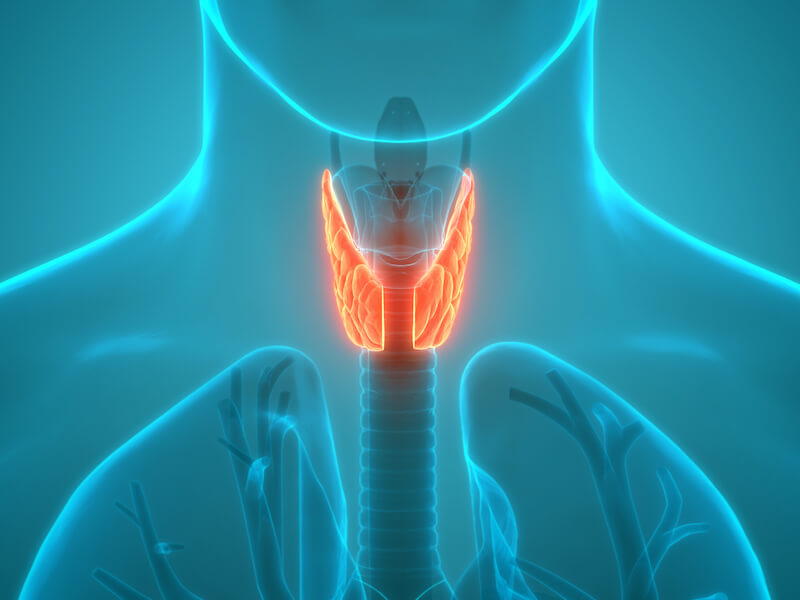
Maybe it’s your thyroid
It isn’t the first time you’ve heard this. Your best friend has some experience with thyroid problems and suggested over dinner that you might be coping with a similar problem.
Thyroid conditions aren’t that uncommon as it turns out. Around 200 million individuals worldwide cope with a thyroid problem according to some estimates.
So… maybe it is your thyroid!
Understand your thyroid
To completely understand what causes issues in the thyroid gland, it’s helpful to talk about what your thyroid really does and how it ordinarily functions.
Inside of your neck, just beneath your larynx, is a butterfly shaped gland known as the thyroid. Your thyroid isn’t something you can see or feel and when it’s healthy you won’t even notice it.
Responsible for extracting iodine from food, your thyroid helps control your metabolism by producing essential hormones. So although you don’t notice it, your thyroid is an essential part of your total health and vitality.
There are two basic ways that your thyroid can lead to problems. Either your thyroid can be overly active or not active enough, either way, you’ll start to experience symptoms.
Over-active thyroid
Hyperthyroidism is an affliction that happens when the thyroid gland is overactive. Too many hormones that help control your metabolism are produced when this condition happens. The rhythm of your body increases. And, look, that might sound like a good thing (you might presume it means you can eat like a teenager again), but an unnaturally fast metabolism can create lots of issues including heart palpitations, increased sweating, irritability, rapid weight loss, and more. Your thyroid can even grow enlarged.
A wide variety of problems, from Graves’ Disease to hyperthyroiditis, can cause an enlarged thyroid. In some cases, it’s genetic or hereditary. But it’s more common in women and people who deal with chronic illness.
Here are some treatments for an overactive thyroid.:
- Thionamides
- Beta-blockers,
- Radioactive iodine treatment
You likely won’t start feeling better with these treatments for a couple of months.
When your thyroid slows down
An underactive thyroid, on the other hand, is known as hypothyroidism. A slower metabolism is the outcome. Symptoms can include weight gain (or weight stubbornly hanging around no matter how much you exercise you do or how well you eat), brittle nails, loss of hair, or sluggishness. An overall feeling of exhaustion can also happen.
Here are the causes of hypothyroidism:
- Pituitary disorders
- Pregnancy
- Congenital disease
- Iodine deficiency
The course of action for hypothyroidism usually includes synthetic hormones. You will usually begin feeling better after you start taking these hormones.
How can you tell which of these two conditions you’re addressing?
It can be challenging to diagnose a thyroid condition. They can frequently pass themselves off as other conditions. So how do you know if you’ve got a thyroid issue? If you notice any of these 6 symptoms it’s time to schedule an appointment with us.
- Weight changes: Weight changes can occur from both hyperthyroidism and hypothyroidism. You’ll unexpectedly lose weight when your thyroid is overactive. That weight will be hard to lose when your thyroid is underactive. Weight changes may not be inherently good or bad, but an incapacity to influence your weight can be worrying.
- Enlarged neck: Your neck, in some circumstances, will make space. In these situations, you may notice a growing lump on your neck. We typically call this kind of growth a goiter. And that goiter can be an indication of an enlarged thyroid. If you detect this, you should talk to us as soon as you can.
- Heart rate changes: Weight gain or loss is how most individuals think of metabolism changes, but the rate at which your body transforms food into energy (the broad definition of metabolism) can have physical impacts. When your thyroid causes your metabolism to speed up or slow down, for example, sudden changes in your heart rate can happen.
- Sleep issues: If hyperthyroidism is giving you too much energy to lay still, it can cause sleep loss. Hypothyroidism can make it hard to get up in the morning, you don’t have the energy to wake up! A thyroid problem could be the culprit if you’re noticing either of these.
- Brain Fog: When your body isn’t creating or utilizing energy efficiently, your nervous system slows down. You can feel tired and sluggish, even in terms of your thinking. Most doctors call this “brain fog,” and it can be a significant symptom of thyroid issues.
- Difficulty swallowing: There’s only so much space in your neck! A thyroid that is hyperactive will have a tendency to get larger. And if your thyroid is growing, it will probably cause a little bit of trouble swallowing. That’s because your esophagus may be getting crowded out by your thyroid.
It’s not difficult for doctors to treat thyroid issues
For you, a normally working thyroid is the ideal. That way, your body eliminates iodine, and you obtain the metabolism-regulating hormones you require. But if something’s wrong, we will likely be able to help you find a solution. The majority of thyroid conditions can be controlled and treated, meaning you’ll quickly see symptom relief.
Make an appointment for a consultation today.